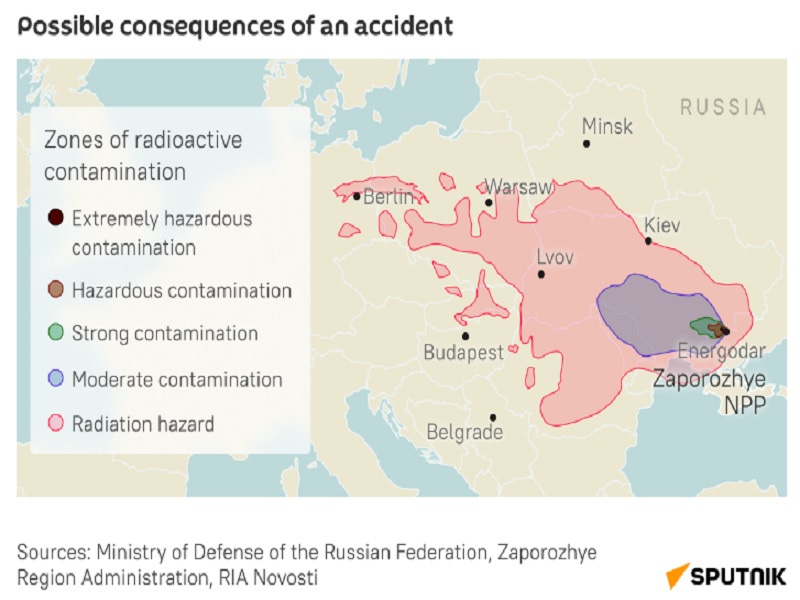Analyzing The Talks About A Security Zone Around The Zaporozhye Nuclear Power Plant
The strategic significance in these talks lies with Russia’s interest in de-militarizing part of its newly reunified territories upon Kiev agreeing to do the same along its part of the LOC. This in turn reinforces the conclusion that the Ukrainian Conflict has shifted into a defensive one for Moscow, which explains why it would officially countenance such a pragmatic de-escalation measure. It also shows that its “shock and awe” campaign hasn’t successfully neutralized Kiev’s threat to the ZNPP.
Talks are underway between Russia, the International Atomic Energy Agency (IAEA), and Kiev over establishing a security zone around the Zaporozhye Nuclear Power Plant (ZNPP). This development is much more strategically significant since many might initially think since it signals the tacit intentions of those three parties, which are in turn influenced by their respective approach to the latest phase of the Ukrainian Conflict. The present piece will concisely clarify the aforesaid for the audience.
Before proceeding, all readers must agree to a common baseline of reality that accepts the following three facts: 1) Russia presently controls the ZNPP; 2) it’s ridiculous to claim that Moscow is shelling its own nuclear site, hence why credence should be extended to Moscow’s claims that Kiev is responsible for these attacks; and 3) Russia nowadays regards the ZNPP as being within its own territory after September’s referenda. Only after agreeing to these facts can any insight be obtained from this analysis.
Having clarified that, the latest phase of the Ukrainian Conflict can objectively be described as a defensive one for Russia following its setbacks in Kharkov and Kherson Regions over the past three months. Those developments compelled the Kremlin to focus on reinforcing the Line of Control (LOC) instead of seriously contemplating forthcoming on-the-ground offensives. At the same time, however, Moscow continues launching massive airstrikes against its opponent’s dual-use infrastructure.
For as effectively as the aforementioned might have been in disrupting military developments far behind the LOC, they’ve nevertheless struggled to put a stop to Kiev’s continued shelling of the ZNPP, which is being carried out with Western munitions. This is a troublesome observation to be sure since it shows that Russia’s “shock and awe” campaign that it commenced in early October following the Crimean Bridge terrorist attack hasn’t averted the risk of a nuclear catastrophe at that site, which remains acute.
Despite the IAEA declining to blame Kiev for these dangerous provocations, it still seemingly considers the situation serious enough to warrant its representatives’ intervention in attempting to broker a security zone deal between the two conflicting sides. This explains why its chief expressed hope that a deal could be struck by the end of the year, albeit conditional on Russia withdrawing some of its nearby weaponry.
Moscow, however, maintained that it won’t do so unilaterally and will only agree to this if guarantees are in place for ensuring that Kiev doesn’t exploit this potential goodwill gesture in order to regroup, rearm, and resume hostilities against its former regions that reunified with Russia. It also said that there’s no chance that it’ll agree to a third party like the IAEA or anyone else assuming control of the ZNPP since the former lacks the legal authority and only Russia can properly ensure operations anyhow.
Be that as it is, the strategic significance in these talks lies with Russia’s interest in de-militarizing part of its newly reunified territories upon Kiev agreeing to do the same along its part of the LOC. This in turn reinforces the prior conclusion that the Ukrainian Conflict has shifted into a defensive one for Moscow, which explains why it would officially countenance such a pragmatic de-escalation measure. It also shows that its “shock and awe” campaign hasn’t successfully neutralized Kiev’s threat to the ZNPP.
Furthermore, the most politically sensitive observation that can be made from Russia’s latest stance is the innuendo that it recognizes the LOC as the international boundary between its newly reunified territories and the rest of rump Ukraine. The official border hasn’t yet been formally delineated so this opens up the opportunity for the LOC playing that role as part of a potential peace agreement sometime later. It’s this insight that’s the most strategically significant of everything that’s been shared thus far.
Kiev, however, is officially clinging to its maximum aims in the conflict wherein it continues to insist that it must first reconquer all of its former regions without exception prior to resuming peace talks. In the event that it agrees to international guarantees for preventing its exploitation of this potential goodwill gesture, then that would tacitly signal a tangible climbdown from its prior position and thus open the way for resuming talks without its maximum objective having first been obtained.
It's too early to predict what it’ll do, but observers should still incorporate the insight from the preceding two paragraphs into their scenario forecasts of the Ukrainian Conflict. Russia doesn’t seem inclined to budge on its legal claims to those parts of Ukraine’s former Zaporozhye Region that it presently controls, especially since their reunification with the mainland a few months back means that it’s constitutionally impossible for Moscow to reverse this position anyhow.
Even so, however, it doesn’t serve as an obstacle to its decisionmakers pragmatically countenancing the mutual disengagement of their forces and Kiev’s some distance away from the LOC in order to secure the ZNPP by eliminating the pretext that its opponent has exploited for continuing to shell that site. If successfully implemented and maintained, the scenario of which is too early to predict with any confidence, the established precedent could provide the formula for a future ceasefire.



I think in part the reason the Kremlin is still talking to the IAEA on this matter is more because they cannot afford to breakup with the agency, it would endanger tens of billions of revenue for Rosatom, which is building numerous power plants across the world.